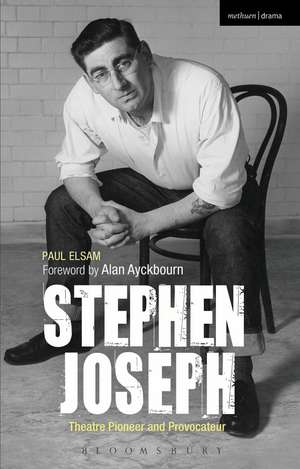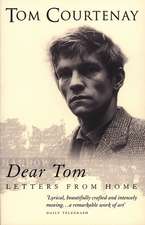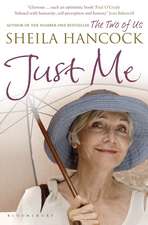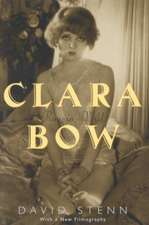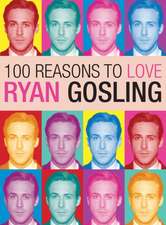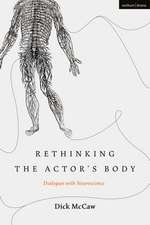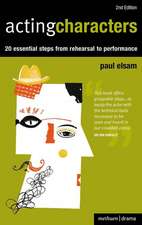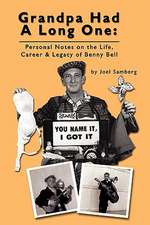Stephen Joseph: Theatre Pioneer and Provocateur
Autor Paul Elsamen Limba Engleză Paperback – 24 sep 2014
Preț: 152.20 lei
Nou
Puncte Express: 228
Preț estimativ în valută:
29.12€ • 30.41$ • 24.05£
29.12€ • 30.41$ • 24.05£
Carte tipărită la comandă
Livrare economică 15-29 aprilie
Preluare comenzi: 021 569.72.76
Specificații
ISBN-13: 9781472586711
ISBN-10: 1472586719
Pagini: 224
Ilustrații: 6 bw integrated illus
Dimensiuni: 140 x 216 x 18 mm
Greutate: 0.29 kg
Editura: Bloomsbury Publishing
Colecția Methuen Drama
Locul publicării:London, United Kingdom
ISBN-10: 1472586719
Pagini: 224
Ilustrații: 6 bw integrated illus
Dimensiuni: 140 x 216 x 18 mm
Greutate: 0.29 kg
Editura: Bloomsbury Publishing
Colecția Methuen Drama
Locul publicării:London, United Kingdom
Caracteristici
The first book to explore the work of Stephen Joseph who collaborated with many theatre-makers in his day
Notă biografică
Paul Elsam trained as an actor at the former Manchester Polytechnic School of Theatre, UK, and has worked widely as a performer in theatre, radio, film and television, including in BAFTA and Olivier-nominated productions on stage and screen. He has directed professional actors and students in both the UK and the USA, often working 'in the round'. He has held teaching posts at the universities of Hull and Teesside, and at the Academy of Live and Recorded Arts. He maintains a strong research interest in post-war theatre historiography, and in the praxis of actor training.
Cuprins
Foreword by Sir Alan AyckbournAcknowledgementsList of illustrationsIntroductionStephen Joseph: TimelineChapter One: MissionChapter Two: Ayckbourn and Cheeseman - twin protégésChapter Three: Joseph's Seven Routes to the UnknownChapter Four: New MakersChapter Five: Joseph and the EstablishmentConclusionAfterwordAppendixBibliography
Recenzii
There are good reasons for theatre-makers, scholars and historians to read this fascinating study salvaging the achievements and hidden legacy of a pioneer and provocateur ... The publication is neither a dry chronicle nor a technical manual prescribing methods for advancing socially inclusive theatre. Rather, it is a lively synthesis of anecdotal incidents, opinions and events culled from interviews and publications astutely integrated with meticulous scholarship offering oblique insights into a wealth of unfamiliar cultural norms ... Moreover, the writing is that of a theatre historian with a keen dramaturgical sense of presenting his subject ... Elsam's publication offers a fine template for South African research scholars. More crucially, for anyone committed to practices that are culturally inclusive and transformative, transposing Joseph's ideas to the South African context offers dynamic ways of thinking about collaborative practice, the choice of stories to tell and presentation styles to adopt.
Elsam has been at pains to explore even indirect traces of Joseph's impact on theatre and theatrical practitioners and to demonstrate the effects of his work into the present century. . Elsam provides substantial information, much of it drawn from letters, about Joseph's efforts to find support for his experimental work and about his quarrels with established theater critics such as W.A. Darlington and Kenneth Tynan.
In this well-researched study, the author strives to offer 'a fresh and deep reappraisal of Joseph's work, and a thorough re-examination of his discoveries' (x)-which he does. . [Elsam's] book makes a powerful case as to the centrality of Stephen Joseph in British theatrical history and practice.
Elsam has been at pains to explore even indirect traces of Joseph's impact on theatre and theatrical practitioners and to demonstrate the effects of his work into the present century. . Elsam provides substantial information, much of it drawn from letters, about Joseph's efforts to find support for his experimental work and about his quarrels with established theater critics such as W.A. Darlington and Kenneth Tynan.
In this well-researched study, the author strives to offer 'a fresh and deep reappraisal of Joseph's work, and a thorough re-examination of his discoveries' (x)-which he does. . [Elsam's] book makes a powerful case as to the centrality of Stephen Joseph in British theatrical history and practice.
